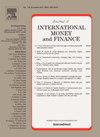Market mechanisms for energy transition: Fossil energy price shocks and irrational renewable energy financing
IF 3.3
2区 经济学
Q2 BUSINESS, FINANCE
引用次数: 0
Abstract
China is taking a leading role in the renewable energy industry and is dedicated to promoting the market-based operation mechanism of the energy transition. Nearly all media attribute it to industrial policies; however, this is insufficient to explain the periodic overcapacity risk behind the rapid development − neglecting the market irrationality behind the prosperity and failing to provide further guidance for the proactive government. Based on the micro-level evidence of enterprise business data, this study explores the market feedback mechanism between renewable energy business expansion and financing under the fossil energy price shocks to disclose the market irrationality mechanism triggered by coal, a key inducement. We first establish an empirical framework to explore the relationship, which remains stable under instrumental variable regression and dual-factor moderating effect with extreme weather damage. Furthermore, we compare the mechanisms of China and the United States to furnish more empirical evidence. The results demonstrate that China’s renewable energy financing displays irrationality in signal transmission and market financing feedback, as well as the possible presence of market overreaction by analyzing the financing feedback during the occurrence and disappearance of fossil energy price shocks. The findings offer further policy operability for the theory of active government.
能源转型的市场机制:化石能源价格冲击与非理性的可再生能源融资
中国在可再生能源产业中处于领先地位,致力于推动能源转型的市场化运行机制。几乎所有媒体都将其归因于产业政策;然而,这不足以解释高速发展背后的周期性产能过剩风险,忽视了繁荣背后的市场非理性,无法为积极主动的政府提供进一步的指导。本研究基于企业经营数据的微观层面证据,探索化石能源价格冲击下可再生能源业务扩张与融资之间的市场反馈机制,揭示煤炭这一关键诱因引发的市场非理性机制。首先,我们建立了一个实证框架来探讨在工具变量回归和双因素调节作用下与极端天气灾害的稳定关系。此外,我们还比较了中国和美国的机制,以提供更多的经验证据。通过分析化石能源价格冲击发生和消失过程中的融资反馈,研究结果表明中国可再生能源融资在信号传递和市场融资反馈方面存在不合理性,并可能存在市场过度反应。研究结果为积极政府理论提供了进一步的政策可操作性。
本文章由计算机程序翻译,如有差异,请以英文原文为准。
求助全文
约1分钟内获得全文
求助全文
来源期刊

Journal of International Money and Finance
BUSINESS, FINANCE-
CiteScore
4.20
自引率
4.00%
发文量
141
期刊介绍:
Since its launch in 1982, Journal of International Money and Finance has built up a solid reputation as a high quality scholarly journal devoted to theoretical and empirical research in the fields of international monetary economics, international finance, and the rapidly developing overlap area between the two. Researchers in these areas, and financial market professionals too, pay attention to the articles that the journal publishes. Authors published in the journal are in the forefront of scholarly research on exchange rate behaviour, foreign exchange options, international capital markets, international monetary and fiscal policy, international transmission and related questions.
 求助内容:
求助内容: 应助结果提醒方式:
应助结果提醒方式:


